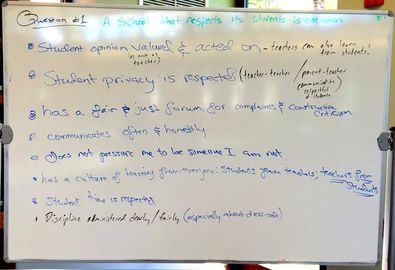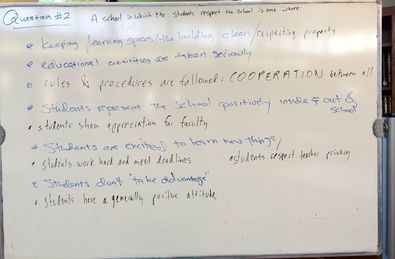"How many times have you been complimented for being respectful?"
That was a question I wanted to ask at our school-wide assembly yesterday, but didn't.
The purpose of the assembly was twofold. I wanted our student body to understand that everything we all want to accomplish here - whether we're students or faculty, more focused on the academics or the extra-curriculars, worried most about college acceptance or social acceptance, actively pursuing religious growth or just beginning a spiritual journey - the success of any and all of it is predicated on cultivating a culture of respect. I also wanted our students to consider that "respect" is not simply something that adults demand of them, but something they want and ought to demand of others. Most importantly, I wanted our students to understand that they didn't need a lecture on respect. Rather, all they needed was a little prodding and a forum to be heard, and then they'd demonstrate to themselves that they know exactly what a culture of respect really looks like.
 So, I created a protocol (educators beware: in debriefing with our faculty afterward, we all agreed that the 5 minutes allocated to each segment was too long and that we'd shorten it if done again) loosely based on the design thinking protocols developed by Tim Brown, and attempted to give all of our students an equal opportunity to weigh in on what a culture of respect at our school might look like. After brainstorming on post-it notes and then sharing their ideas with their peers, the students collaboratively selected what they believed to be the best of their suggestions, gave them to our faculty who sorted them into similar themes and then presented their ideas back to them. Not surprisingly, their answers were spot on.
So, I created a protocol (educators beware: in debriefing with our faculty afterward, we all agreed that the 5 minutes allocated to each segment was too long and that we'd shorten it if done again) loosely based on the design thinking protocols developed by Tim Brown, and attempted to give all of our students an equal opportunity to weigh in on what a culture of respect at our school might look like. After brainstorming on post-it notes and then sharing their ideas with their peers, the students collaboratively selected what they believed to be the best of their suggestions, gave them to our faculty who sorted them into similar themes and then presented their ideas back to them. Not surprisingly, their answers were spot on.
 While this assembly was intended to be the beginning of a conversation and not the end of one, it dawned on me that there may be one critical piece of the conversation that we - the adults - ought to more seriously consider. When was the last time we complimented our students - or our children - for being respectful? Yes, if we're doing our jobs well either as parents or teachers, we tell them when they are "nice" and "helpful" and we tell them when they do "a good job" or "make us proud." But complimenting a child for being respectful - all the more so a teen - is simply not a construct we often employ. "Wow, that was very respectful of you" and "I really liked the way you showed respect there" just don't roll off our tongues like "that was very nice of you" or "I really liked the way you behaved there."
While this assembly was intended to be the beginning of a conversation and not the end of one, it dawned on me that there may be one critical piece of the conversation that we - the adults - ought to more seriously consider. When was the last time we complimented our students - or our children - for being respectful? Yes, if we're doing our jobs well either as parents or teachers, we tell them when they are "nice" and "helpful" and we tell them when they do "a good job" or "make us proud." But complimenting a child for being respectful - all the more so a teen - is simply not a construct we often employ. "Wow, that was very respectful of you" and "I really liked the way you showed respect there" just don't roll off our tongues like "that was very nice of you" or "I really liked the way you behaved there."
 So what? Isn't this, quite literally, just semantics? I'd argue it isn't. The act of complimenting, particularly when it comes to children and young adults, is not just an act of recognition. It's an act of education. When we point out to children when they are being "nice" we help them understand what "nice" means to us and what it looks and feels like in real life. When we thank them for being helpful, we are educating them as to what we consider to be a "help" not in the abstract sense, but within the context of life as they live it. The next time, therefore, we ask them to be "nice" or "helpful" they have a more nuanced and sophisticated understanding of what our expectations really are and how to go about meeting them.
So what? Isn't this, quite literally, just semantics? I'd argue it isn't. The act of complimenting, particularly when it comes to children and young adults, is not just an act of recognition. It's an act of education. When we point out to children when they are being "nice" we help them understand what "nice" means to us and what it looks and feels like in real life. When we thank them for being helpful, we are educating them as to what we consider to be a "help" not in the abstract sense, but within the context of life as they live it. The next time, therefore, we ask them to be "nice" or "helpful" they have a more nuanced and sophisticated understanding of what our expectations really are and how to go about meeting them.
We parents and teachers ask children for respect all the time. Indeed, we often demand it. Yet it may do us well to consider how and how often we teach it. The chances are that our children have a bank of memories and learning moments in which we taught them what "disrespect" looks like, what it feels like to them, and how much it displeases us. But assuming that all children can accurately construct a set of positive actions from a set of negative instructions - without the help of a corollary bank of positive memories and moments - may be faulty reasoning on our part. Moreover, even if most children can accurately recite definitions of respect in the abstract (as our protocol demonstrated they can), the feeling and nuance which they gain from being taught in the moment, from experiencing the learning rather than contemplating it, is something that many of them may be missing.
So if we are truly interested in inculcating the value of respect in our students and children, perhaps the place to start is by noticing when they are being respectful, letting them know that we notice, and helping them to learn exactly what it is that we mean.
CEO of the Ades Family Foundation. Founding Head of School of the Jewish Leadership Academy. Fascinated with the Jewish future.
